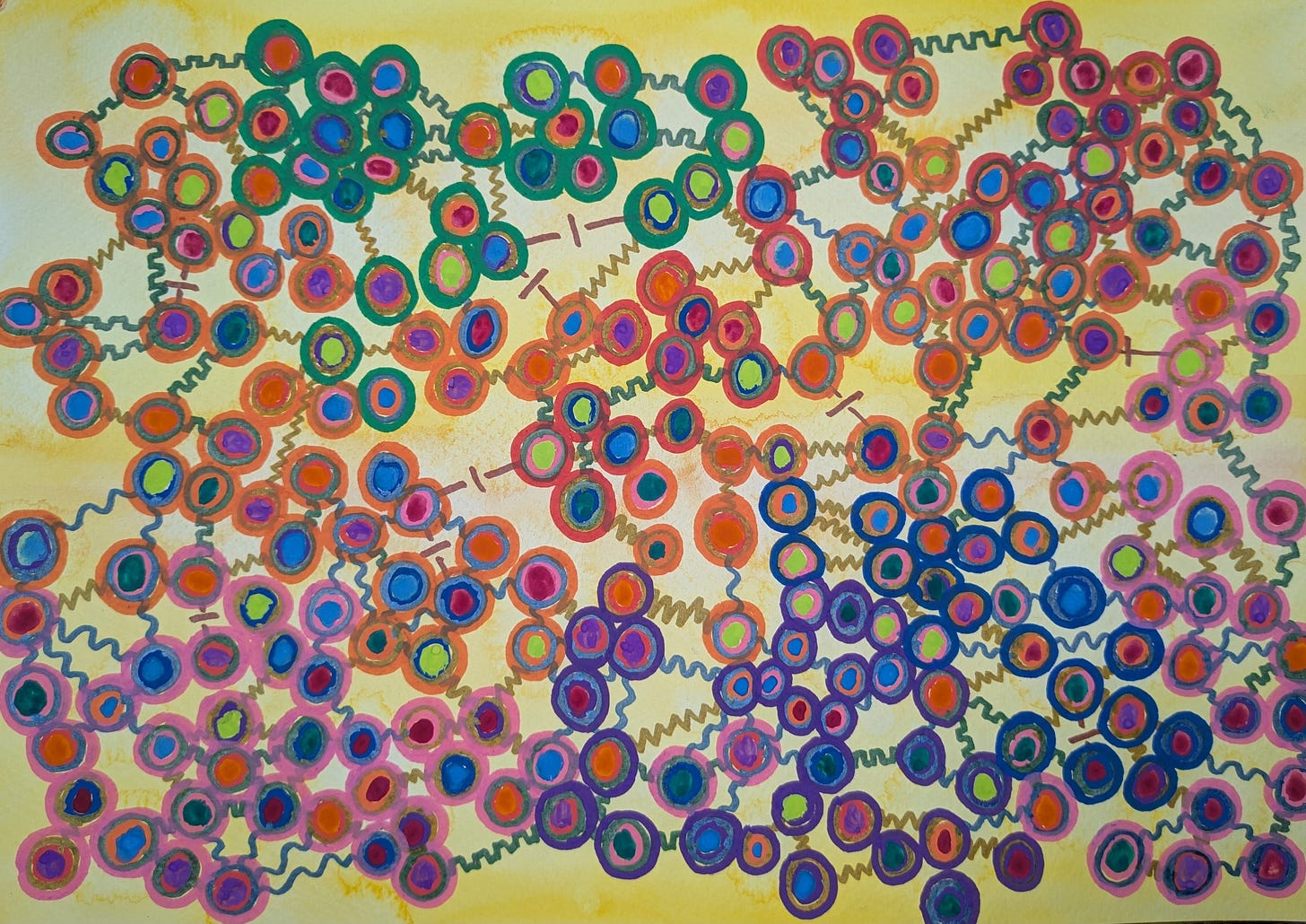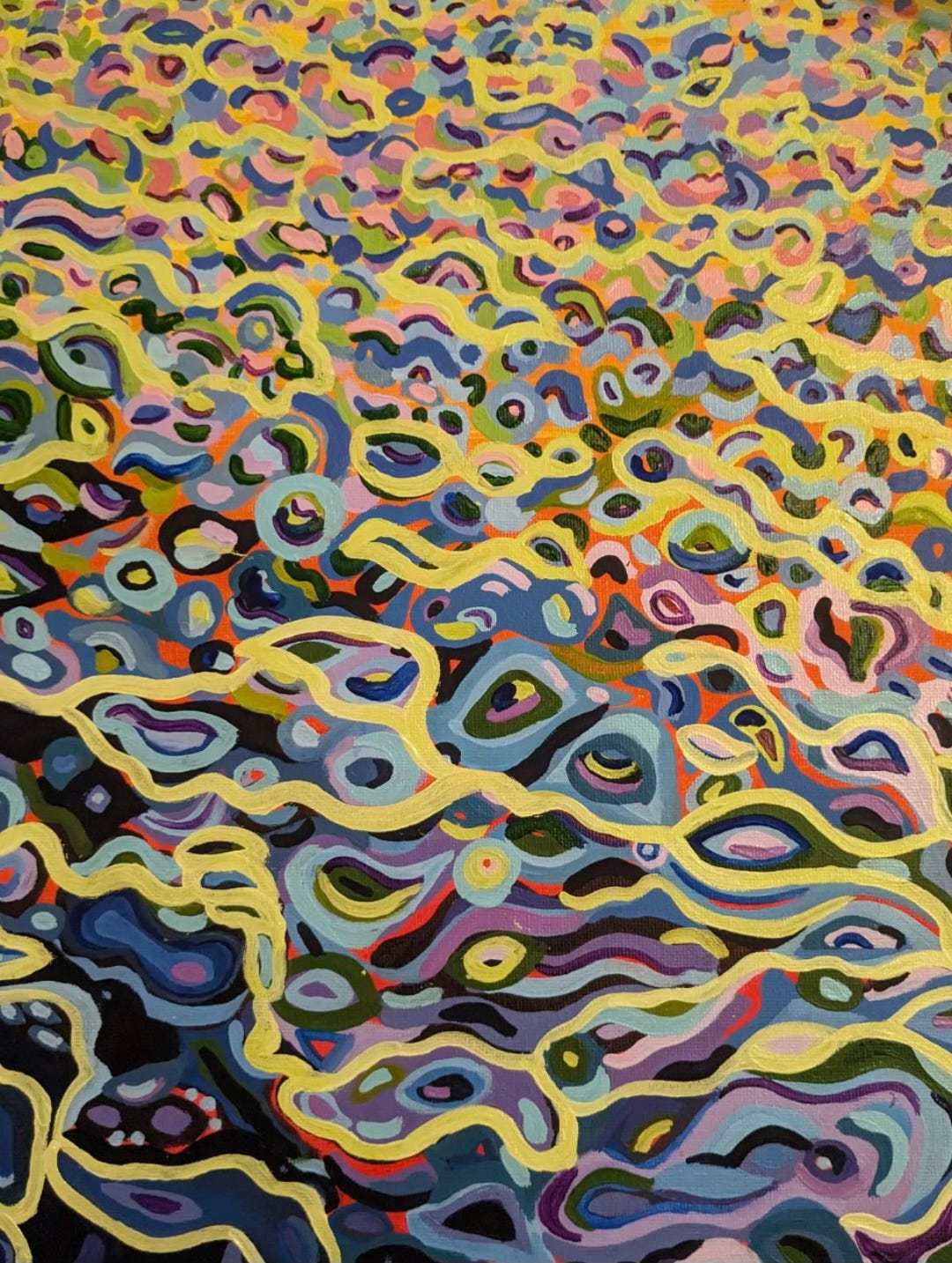Do You Still Think About Me?
A collaboration: Friendship loss through a neurodivergent lens.
Hello friends,
I have something special for you today - my first guest post!
generously shared her friendship experience in the Purposeful Connection chat recently and I was excited when A agreed to expand on it in a guest essay. We enjoyed collaborating on it behind the scenes and I’m happy to share their essay on the impact of friendship loss, finding self-trust, and strengthening friendships with you today.
A is a queer, chronically ill, late-realized autistic and ADHD human. A is a poet/writer. A is a married parent of two incredible tiny humans, one beautiful dog, two adorable cats, and numerous plants. A is a practicer of stitchcraft and, occasionally, a knit designer. Also: an aspiring Hobbit. Read A’s publication Writing Wilder here.
Rachel of created the beautiful artwork for today’s post - I’m so grateful for this collaboration!
Do You Still Think About Me?
by A. Wilder Westgate
As a late-diagnosed AuDHDer, friendship has always been tricky to navigate. When I was young, I struggled to make friends with peers and would cling to those I did have tightly. As I've gotten older, making friends has become much easier; I think this is common for those of us who grew up masking heavily and have later begun to feel more comfortable with ourselves. One thing that hasn't gotten easier over the years, though, is losing friendships.
There was a girl who lived down the street from me in elementary school, and we walked each other home, played in the leaves, watched movies — anything we could do to spend time together — until her family moved away after a year, and we lost their contact information. I don’t even remember her last name, but I still wonder what her life has been like since, and if she ever thinks about me.
Then there was one of my best friends since first grade, who had literally grown up with me; we were in all the same classes, stayed in at recess together to help kindergarteners in the art room, shared clothes and books. We had other friends throughout our school years but kept coming back to each other. In college, we traded letters, and she went out of her way to make sure we could spend time together on breaks. I hand-painted signs for her wedding, and she was a bridesmaid in mine. I cried for her when I found out about her miscarriage, and she grieved with me over mine afterward. Just months before the end of our friendship, she brought me onesies, and we held each other’s rainbow babies.
A couple days after sharing my coming out post on Facebook, I noticed that she had deleted me as a friend. Suddenly, there were no more check-in texts, no card in the mail at Christmas. It’s been about five years since she ghosted me, and I still can’t get over how she threw away a lifetime of friendship without a word.
Most recently, I had a friend who I deeply respected. We had known each other for several years but only started to get closer within the last couple. Our husbands had gone to high school together, our values were aligned, and she was caring, generous, and understanding. She was among the first to send me encouraging words when I shared about struggles, including both my miscarriage and my mental health, and I trusted her to hold whatever we talked about with compassion. We started meeting regularly with our mutual friends to do crafts together, talking about anything and everything, and I was under the impression that we were on good terms. A few months before the end of the friendship, we were talking about making plans to do puzzles and take walks together, but we never got that far.
One day last year, she abruptly ended our friendship. A mistake on my part, which under other circumstances would have been forgivable, ended up being, in her words, the “breaking point.” As I learned only during that last conversation, this friend had been quietly distancing herself from me based on assumptions she had never communicated to me prior to that moment. I tried to clear things up between us, but it was obvious that she had already made up her mind about me, and no apologies or explanations could change it.
It’s a deeply frustrating feeling, knowing that even one person believes things about me that aren’t true, and being misunderstood with no way to fix it. It has taken me a year to feel comfortable with the idea of writing publicly about this experience, because I worried that in doing so, I would be proving part of what this person believed about me to be true. Given what I knew about this friend, and our relationship up to that point (as well as the situation’s heartbreaking coincidence with the loss of my beloved cat of fourteen years), I was incredibly shaken.
I stayed up late replaying conversations, trying to understand how this friend could have misunderstood me so profoundly. I worried all our mutual friends would learn about our break-up and begin to think about me the same way. I think that other neurodivergent folks, especially, can relate to this kind of anxiety and spiraling thoughts over conversations that went differently than we expected or hoped, and this one had me trapped in the same anxious thought loop for several months.
With the friend who’d moved away, and even the one who ghosted me, it was at least in some way predictable or understandable; people often lose touch after moving, and I’d known my other friend’s religious views, even if I didn’t expect her to cut me off so completely. My brain could make sense of these things, even as I grieved them.
It took months of ruminating to see that this other friend had plenty of opportunity to communicate her issues with me, and that I couldn’t have prevented the end of our friendship. I’ve noticed now, going back over later conversations since our break-up, that she hadn’t been as outwardly supportive. She’d stopped heart reacting my messages in our group chat and saying encouraging things. At the time, this was a subtle shift that I chalked up to her being busy, but looking back now, I can see that she had started responding to me differently. I do wonder if the miscommunication ultimately came down to her being neurotypical and expecting me to catch on to her having a problem without actually saying anything.
While my other friendships have (before and since then) proven to be much more solid, I still find myself jumping to worst case scenarios when a friend cancels plans, wondering if they’re making excuses to distance themselves like she had. These friends have shown up for me in every way possible, and it has still been really difficult to continue to give them the benefit of the doubt since my other friend had secretly stopped doing the same for me.
In many ways this has been a lesson in self-trust as much as a practice in grieving and in trusting my friends. I’ve spent years doing everything possible to avoid being misunderstood, and this has reminded me that I don’t have control over how others choose to perceive me, no matter how hard I try. I’m learning all over again that the right people will find me, and that some of them just aren’t meant to stick around forever.
I wish I could say the anxiety stemming from this experience has diminished, but I’m still confronting it a year later. Something that helps, when my brain is trying to convince me that one of my friends suddenly wants nothing to do with me, is to list every meaningful thing they’ve said or done for me, especially recently. This is, at least, some information I can work with when I’m spiraling.
My current friends continue to show up for me with encouragement and compassion (and, yes, heart reacts) as well as in whatever tangible ways are accessible to them; when one of them has to cancel plans, they give more than just a vague reason and they continue to make future plans with me; they celebrate every good thing I share with them and hold space for me when I’m struggling; they actively seek support from me, trusting that I will give it, and willingly offer the same in return. And I also know that, often, they need this kind of reassurance as well, because the rest of my friends are all neurodivergent and have similar struggles; they get it.
So, when I start second-guessing whether my friends secretly think I’m awful, I can look at all the evidence that proves they don’t and remind myself that our friendship is solid, and they’re still present with me. That kind of reciprocity is something I can rely on — and if nothing else, there’s always the very niche memes they send that make me feel seen.
Hanna again, here. Are you feeling the feelings? I know I am. Friendships are hard to navigate sometimes, aren’t they? I’d love to hear about your own friendship experience in the comments or simply by responding to this email.
And finally, please show A and Rachel some love - here in the comments or over on their publications!
Next week: neuroqueering friendships!
-Hanna
P.S. Remember to tell your friends how much they mean to you!











Thank you so much for reaching out to me, Hanna! 🧡 I loved this experience and being able to work with you and Rachel.
This whole collaboration and letter was so resonant and beautiful and meaningful…and timely, as I am going through something very similar to what you wrote about…and feeling the very same way am regarding writing about it.
This piece brought me comfort, and made me feel less alone. I have also been looking at the friendships that continue to be meaningful and looking to the places where I can let people know how grateful I am to them.
I think, what I’ve realized, is that maybe I’m not meant to have “best” friendships. Because I really make space for that one person in a way that…maybe is unsustainable?
I shall go away and reflect some more.
Thank you A. for writing about your experience. And to Hanna for making space and Rachel for your gorgeous art.